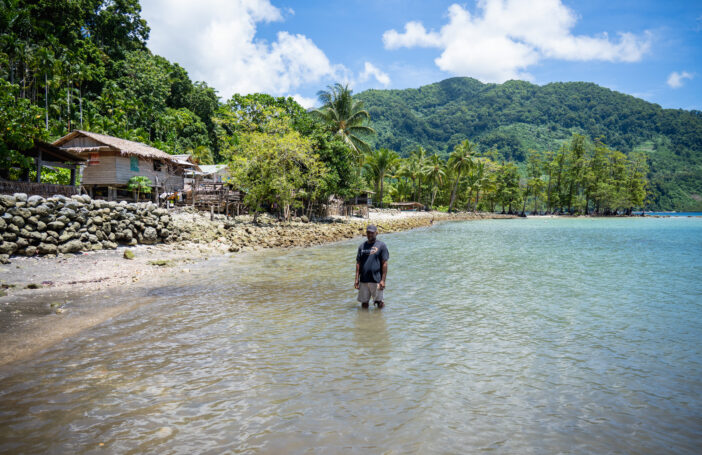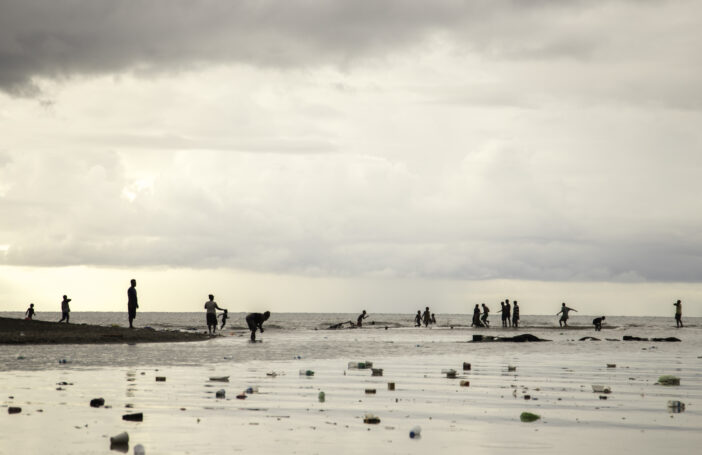Loss and damage caused by climate change represents one of the most pressing global challenges and, given that Global South countries bear little responsibility for emissions leading to the climate crisis, one of the clearest examples of climate injustice today.
Oxfam in Bangladesh, with the support of Oxfam Australia and the Swedish International Development Cooperation Agency, has created the Loss and Damage Dashboard, a first-of-its-kind, participatory, real-time platform where grassroots communities can document their economic and non-economic losses and damages from climate change. This is the data that is usually missing in top-down, high-level national major climate disaster reporting. Trialled in Bangladesh, it allows community members to input their losses via phone, tablet or laptop and it cross-references and validates these accounts against climatological data and remote sensing via Google Earth Engine satellite data.
From lost crops and damaged homes to personal trauma, forced displacement and cultural loss, the dashboard captures both economic and non-economic harms that are too often ignored or rendered invisible in traditional climate damage assessments. A new report on the project reveals the true costs of climate change at a local level and for highly marginalised communities.
Between June 2023 and March 2024, over 11,500 incidents were reported to the dashboard across 19 districts in Bangladesh, totaling more than A$17 million in damage. For each person that reported loss and damage, they experienced an average loss of A$1,500, equivalent to 15 months of work for the average Bangladeshi.
The largest category was not infrastructure or agriculture but non-economic loss. This includes mental health impacts, family and community breakdown and gender-based violence. Women reported gender-specific impacts, with high rates of water-borne disease, malnutrition, skin illness and reproductive health problems, derived from persistent climate-induced impacts such as food insecurity and unsafe living conditions. These kinds of harms, brought to the fore through the dashboard, are often either unseen or sidelined in policy and funding decisions.
Loss and damage has been solidifying as the third key pillar of international climate action, alongside mitigation and adaptation. Momentum on the issue has been accelerated by the historic establishment of the Fund for Responding to Loss and Damage (FRLD) at COP28, to assist developing countries particularly vulnerable to the impacts of climate change, respond to loss and damage. While economic losses and damages for developing countries have been estimated at US$400 billion to US$1.6 trillion by 2030, the FRLD has only received US$768.4 million in pledges, and US$401.1 million in paid contributions. With the Fund’s initial US$250 million start-up phase, known as the Barbados Implementation Mechanism, to be launched at next week’s COP30, the need for credible, locally-generated loss and damage data has never been more urgent and relevant.
The dashboard cuts through the noise of international negotiations and shows how people and communities are bearing through compounding climate impacts right now. Bangladesh is showing the world what locally led, community-powered climate solutions can look like. With the right tools, and the right investments directed to the right people, we can turn community accounts and evidence into equitable outcomes.
As a wealthy, high-emitting, fossil fuel-exporter country, Australia has a responsibility to ensure that communities facing the worst impacts of the climate crisis have the tools, funding and power they need to recover and adapt. Australia has both the opportunity and the obligation to support this work. Australia, having committed A$50 million to the FRLD at COP29, is also a member of its Board. Australia has made a financial contribution of A$100 million to the Pacific Resilience Facility, a Pacific-led facility that delivers grants for climate adaptation, disaster preparedness and responses loss and damage.
While these commitments are welcomed, Australia has the opportunity to also help ensure that funding reaches the local communities who need it most, and that tools like the dashboard are funded, replicated and integrated into decision-making processes. Whether through climate finance or advocacy at global forums, Australia can help ensure that climate-related loss and damage is no longer invisible, underestimated or ignored.





Thank you for this thoughtful blog. I’m interested in understanding more about the data used by the Dashboard. Could you clarify how the input data distinguishes long-term climate signals from short-term weather variability?
Additionally, how does the analysis separate human-driven climate influences from natural factors such as solar variability? Understanding the methodology behind that separation would really help readers appreciate the strength of the approach you outline.
Thanks again for the informative piece.